The Cambridge History of Japan, Vol. 4: Early Modern Japan
Подождите немного. Документ загружается.

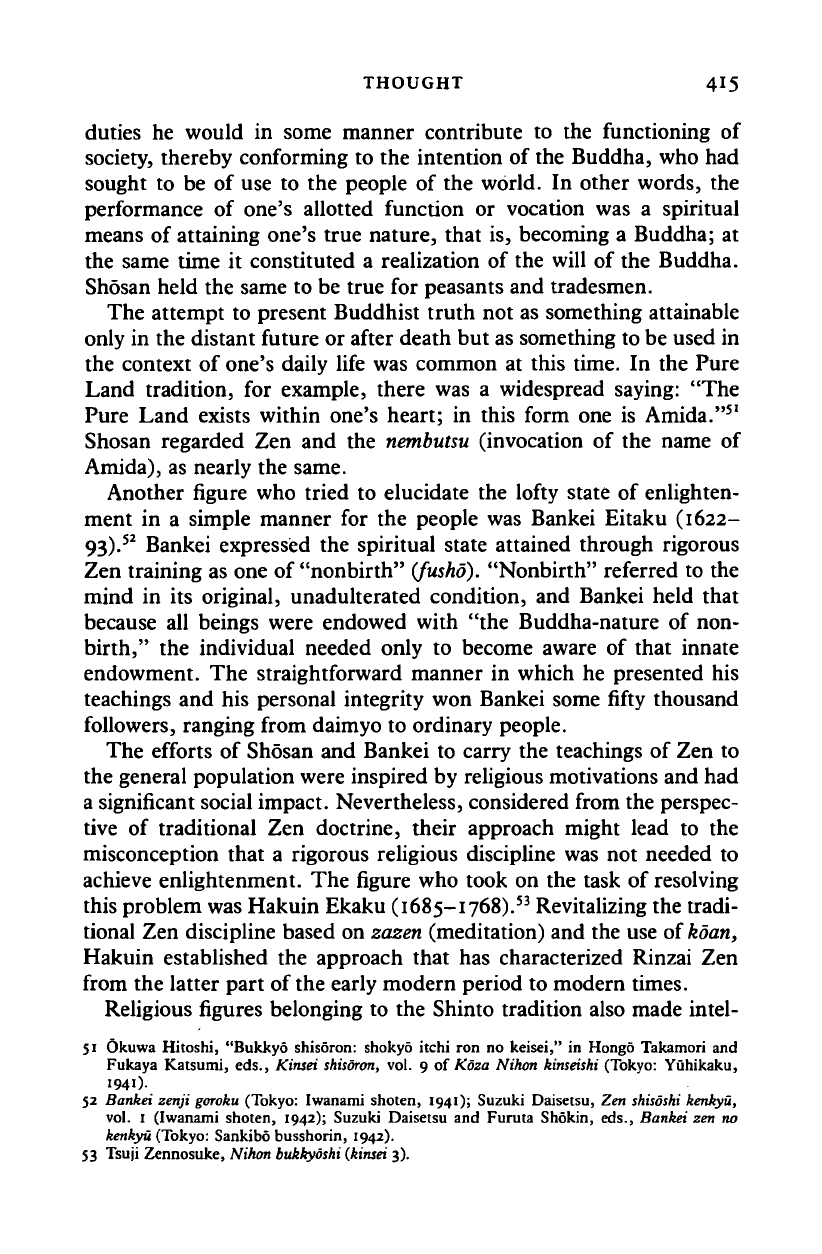
THOUGHT 415
duties he would in some manner contribute to the functioning of
society, thereby conforming to the intention of the Buddha, who had
sought to be of use to the people of the world. In other words, the
performance of one's allotted function or vocation was a spiritual
means of attaining one's true nature, that is, becoming a Buddha; at
the same time it constituted a realization of the will of the Buddha.
Shosan held the same to be true for peasants and tradesmen.
The attempt to present Buddhist truth not as something attainable
only in the distant future or after death but as something to be used in
the context of one's daily life was common at this time. In the Pure
Land tradition, for example, there was a widespread saying: "The
Pure Land exists within one's heart; in this form one is Amida."
5
'
Shosan regarded Zen and the
nembutsu
(invocation of the name of
Amida), as nearly the same.
Another figure who tried to elucidate the lofty state of enlighten-
ment in a simple manner for the people was Bankei Eitaku (1622-
93).
52
Bankei expressed the spiritual state attained through rigorous
Zen training as one of "nonbirth"
(fusho).
"Nonbirth" referred to the
mind in its original, unadulterated condition, and Bankei held that
because all beings were endowed with "the Buddha-nature of non-
birth," the individual needed only to become aware of that innate
endowment. The straightforward manner in which he presented his
teachings and his personal integrity won Bankei some fifty thousand
followers, ranging from daimyo to ordinary people.
The efforts of Shosan and Bankei to carry the teachings of Zen to
the general population were inspired by religious motivations and had
a significant social impact. Nevertheless, considered from the perspec-
tive of traditional Zen doctrine, their approach might lead to the
misconception that a rigorous religious discipline was not needed to
achieve enlightenment. The figure who took on the task of resolving
this problem was Hakuin Ekaku (1685-1768).
53
Revitalizing the tradi-
tional Zen discipline based on zazen (meditation) and the use of
koan,
Hakuin established the approach that has characterized Rinzai Zen
from the latter part of the early modern period to modern times.
Religious figures belonging to the Shinto tradition also made intel-
51 Okuwa Hitoshi, "Bukkyo shisoron: shokyo itchi ron no keisei," in Hongo Takamori and
Fukaya Katsumi, eds., Kinsei
shisoron,
vol. 9 of Koza Nihon kinseishi (Tokyo: Yuhikaku,
1941).
52 Bankei zenji
goroku
(Tokyo: Iwanami shoten, 1941); Suzuki Daisetsu, Zen
shisoshi
kenkyu,
vol. I (Iwanami shoten, 1942); Suzuki Daisetsu and Furuta Shokin, eds., Bankei zen no
kenkyu
(Tokyo: Sankibo busshorin, 1942).
53 Tsuji Zennosuke, Nihon
bukkyoshi (kinsei
3).
Cambridge Histories Online © Cambridge University Press, 2008
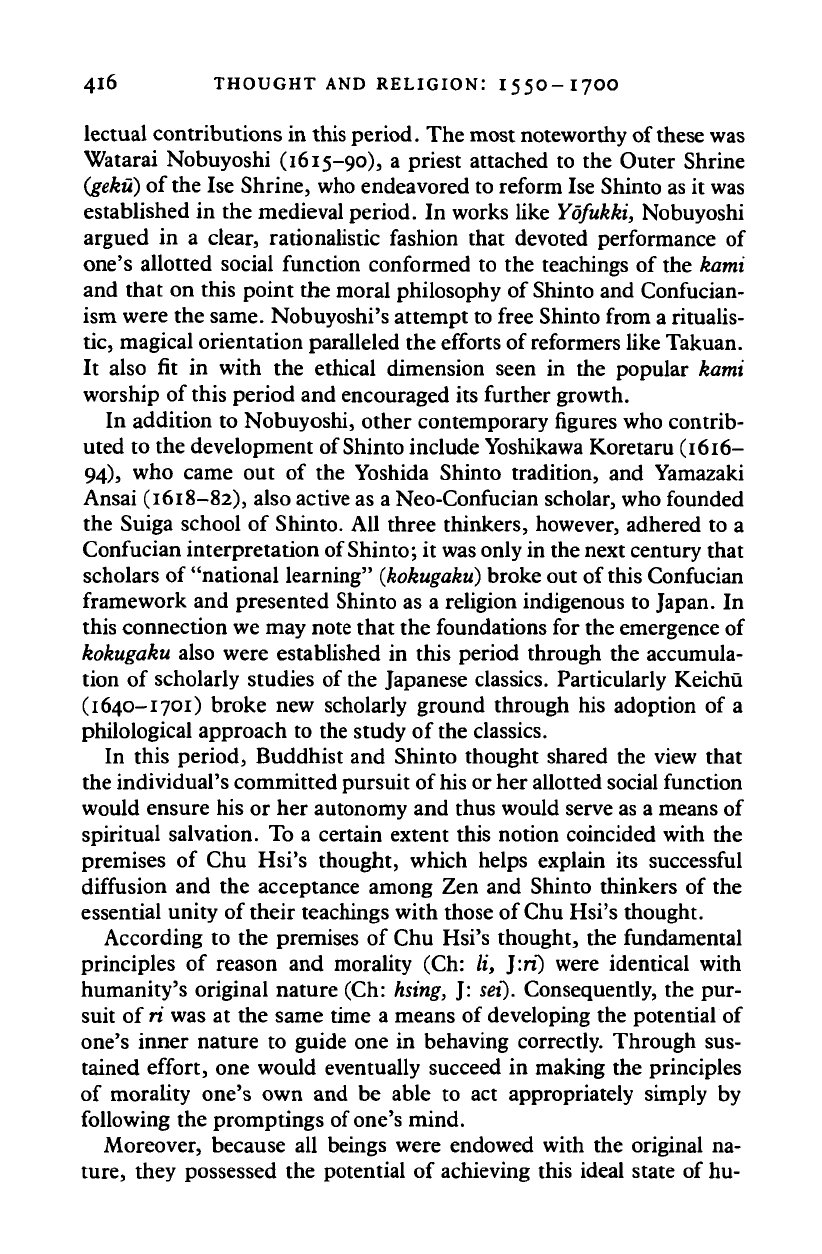
4l6 THOUGHT AND RELIGION: 155O-I7OO
lectual contributions in this period. The most noteworthy of these was
Watarai Nobuyoshi (1615-90), a priest attached to the Outer Shrine
(geku)
of the Ise Shrine, who endeavored to reform Ise Shinto as it was
established in the medieval period. In works like Yofukki, Nobuyoshi
argued in a clear, rationalistic fashion that devoted performance of
one's allotted social function conformed to the teachings of the kami
and that on this point the moral philosophy of Shinto and Confucian-
ism were the same. Nobuyoshi's attempt to free Shinto from a ritualis-
tic,
magical orientation paralleled the efforts of reformers like Takuan.
It also fit in with the ethical dimension seen in the popular kami
worship of this period and encouraged its further growth.
In addition to Nobuyoshi, other contemporary figures who contrib-
uted to the development of Shinto include Yoshikawa Koretaru (1616-
94),
who came out of the Yoshida Shinto tradition, and Yamazaki
Ansai (1618-82), also active as a Neo-Confucian scholar, who founded
the Suiga school of Shinto. All three thinkers, however, adhered to a
Confucian interpretation of Shinto; it was only in the next century that
scholars of "national learning"
(kokugaku)
broke out of this Confucian
framework and presented Shinto as a religion indigenous to Japan. In
this connection we may note that the foundations for the emergence of
kokugaku also were established in this period through the accumula-
tion of scholarly studies of the Japanese classics. Particularly Keichu
(1640-1701) broke new scholarly ground through his adoption of a
philological approach to the study of the classics.
In this period, Buddhist and Shinto thought shared the view that
the individual's committed pursuit of his or her allotted social function
would ensure his or her autonomy and thus would serve as a means of
spiritual salvation. To a certain extent this notion coincided with the
premises of Chu Hsi's thought, which helps explain its successful
diffusion and the acceptance among Zen and Shinto thinkers of the
essential unity of their teachings with those of Chu Hsi's thought.
According to the premises of Chu Hsi's thought, the fundamental
principles of reason and morality (Ch: li, ]:ri) were identical with
humanity's original nature (Ch:
hsing,
J: set). Consequently, the pur-
suit of
ri
was at the same time a means of developing the potential of
one's inner nature to guide one in behaving correctly. Through sus-
tained effort, one would eventually succeed in making the principles
of morality one's own and be able to act appropriately simply by
following the promptings of one's mind.
Moreover, because all beings were endowed with the original na-
ture,
they possessed the potential of achieving this ideal state of hu-
Cambridge Histories Online © Cambridge University Press, 2008
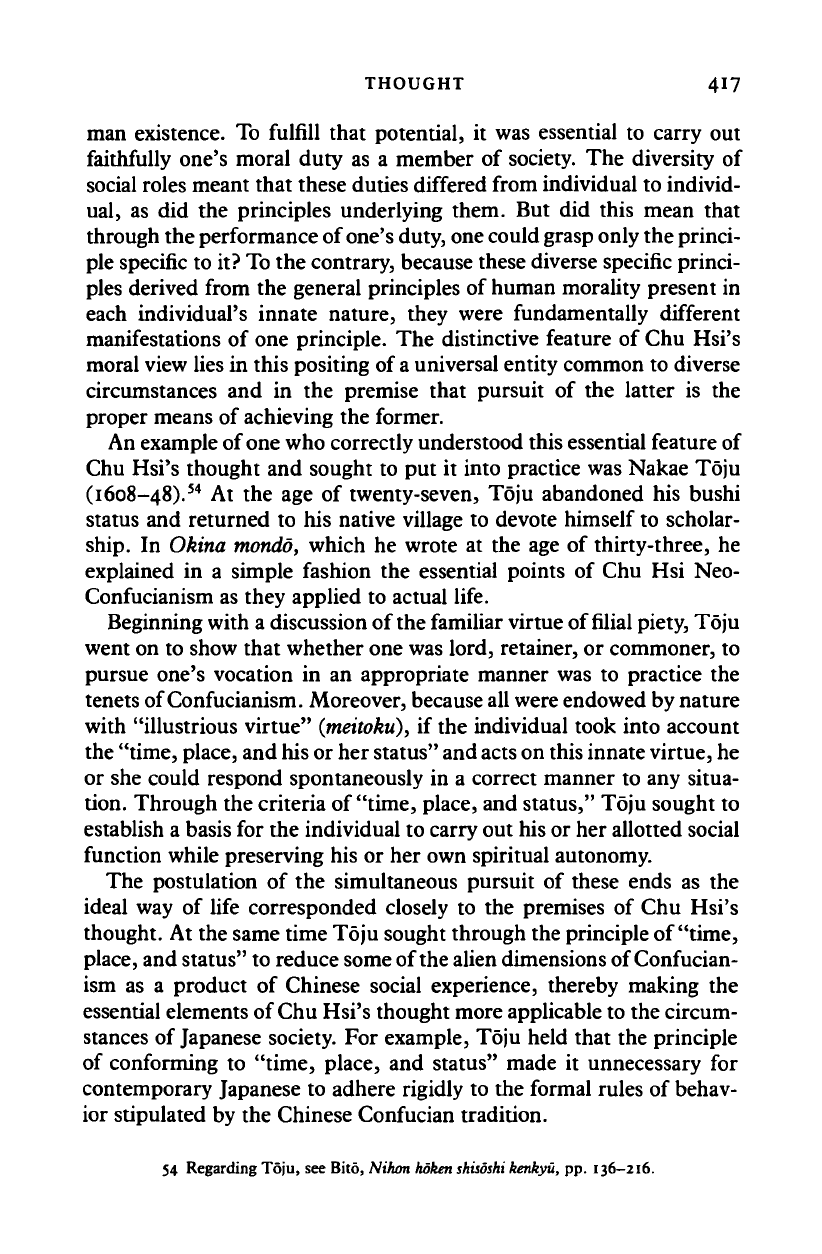
THOUGHT 417
man existence. To fulfill that potential, it was essential to carry out
faithfully one's moral duty as a member of society. The diversity of
social roles meant that these duties differed from individual to individ-
ual,
as did the principles underlying them. But did this mean that
through the performance of one's duty, one could grasp only the princi-
ple specific to it? To the contrary, because these diverse specific princi-
ples derived from the general principles of human morality present in
each individual's innate nature, they were fundamentally different
manifestations of one principle. The distinctive feature of Chu Hsi's
moral view lies in this positing of
a
universal entity common to diverse
circumstances and in the premise that pursuit of the latter is the
proper means of achieving the former.
An example of one who correctly understood this essential feature of
Chu Hsi's thought and sought to put it into practice was Nakae Toju
(1608-48).
54
At the age of twenty-seven, Toju abandoned his bushi
status and returned to his native village to devote himself to scholar-
ship.
In Okina
mondo,
which he wrote at the age of thirty-three, he
explained in a simple fashion the essential points of Chu Hsi Neo-
Confucianism as they applied to actual life.
Beginning with a discussion of the familiar virtue of
filial
piety, Toju
went on to show that whether one was lord, retainer, or commoner, to
pursue one's vocation in an appropriate manner was to practice the
tenets of Confucianism. Moreover, because all were endowed by nature
with "illustrious virtue"
(tneitoku),
if the individual took into account
the "time, place, and his or her status" and acts on this innate
virtue,
he
or she could respond spontaneously in a correct manner to any situa-
tion. Through the criteria of
"time,
place, and status," Toju sought to
establish a basis for the individual to carry out his or her allotted social
function while preserving his or her own spiritual autonomy.
The postulation of the simultaneous pursuit of these ends as the
ideal way of life corresponded closely to the premises of Chu Hsi's
thought. At the same time Toju sought through the principle of
"time,
place, and status" to reduce some of the alien dimensions of Confucian-
ism as a product of Chinese social experience, thereby making the
essential elements of Chu Hsi's thought more applicable to the circum-
stances of Japanese society. For example, Toju held that the principle
of conforming to "time, place, and status" made it unnecessary for
contemporary Japanese to adhere rigidly to the formal rules of behav-
ior stipulated by the Chinese Confucian tradition.
54 Regarding Toju, see Bito, Nihon
hoken shisoshi
kenkyu,
pp. 136-216.
Cambridge Histories Online © Cambridge University Press, 2008
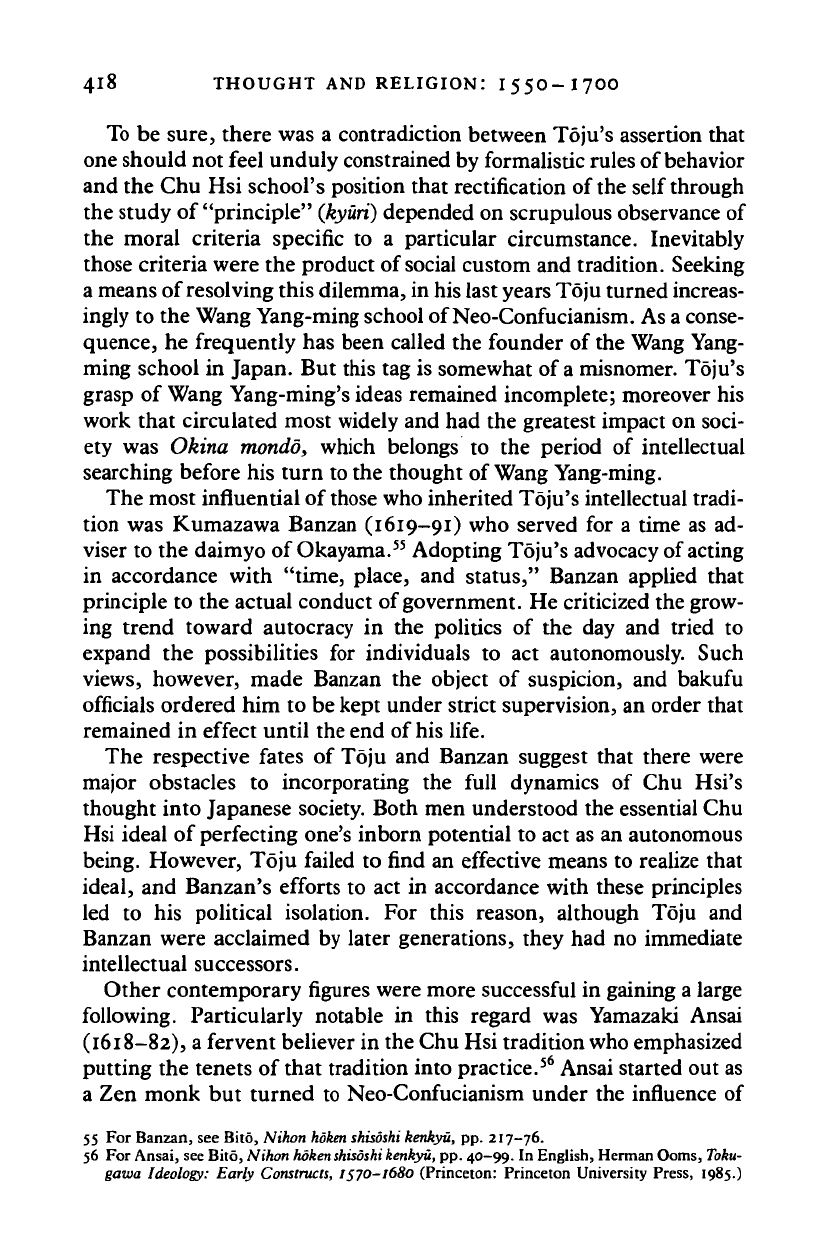
418 THOUGHT AND RELIGION: I55O-I7OO
To be sure, there was a contradiction between Toju's assertion that
one should not feel unduly constrained by formalistic rules of behavior
and the Chu Hsi school's position that rectification of the self through
the study of "principle"
(kyuri)
depended on scrupulous observance of
the moral criteria specific to a particular circumstance. Inevitably
those criteria were the product of
social
custom and tradition. Seeking
a means of resolving this dilemma, in his last years Toju turned increas-
ingly to the Wang Yang-ming school of Neo-Confucianism. As a conse-
quence, he frequently has been called the founder of the Wang Yang-
ming school in Japan. But this tag is somewhat of
a
misnomer. Toju's
grasp of Wang Yang-ming's ideas remained incomplete; moreover his
work that circulated most widely and had the greatest impact on soci-
ety was Okina mondo, which belongs to the period of intellectual
searching before his turn to the thought of
Wang
Yang-ming.
The most influential of
those
who inherited Toju's intellectual tradi-
tion was Kumazawa Banzan (1619—91) who served for a time as ad-
viser to the daimyo of Okayama.
55
Adopting Toju's advocacy of acting
in accordance with "time, place, and status," Banzan applied that
principle to the actual conduct of government. He criticized the grow-
ing trend toward autocracy in the politics of the day and tried to
expand the possibilities for individuals to act autonomously. Such
views,
however, made Banzan the object of suspicion, and bakufu
officials ordered him to be kept under strict supervision, an order that
remained in effect until the end of his life.
The respective fates of Toju and Banzan suggest that there were
major obstacles to incorporating the full dynamics of Chu Hsi's
thought into Japanese society. Both men understood the essential Chu
Hsi ideal of perfecting one's inborn potential to act as an autonomous
being. However, Toju failed to find an effective means to realize that
ideal, and Banzan's efforts to act in accordance with these principles
led to his political isolation. For this reason, although Toju and
Banzan were acclaimed by later generations, they had no immediate
intellectual successors.
Other contemporary figures were more successful in gaining a large
following. Particularly notable in this regard was Yamazaki Ansai
(1618-82), a fervent believer in the Chu Hsi tradition who emphasized
putting the tenets of that tradition into practice.
56
Ansai started out as
a Zen monk but turned to Neo-Confucianism under the influence of
55 For Banzan, see Bito, Nihon
hoken
shisoshi kenkyu, pp. 217-76.
56 For Ansai, see Bito, Nihon hoken
shisoshi
kenkyu, pp. 40-99. In English, Herman Ooms, Toku-
gawa Ideology: Early Constructs, 1570-1680 (Princeton: Princeton University Press, 1985.)
Cambridge Histories Online © Cambridge University Press, 2008
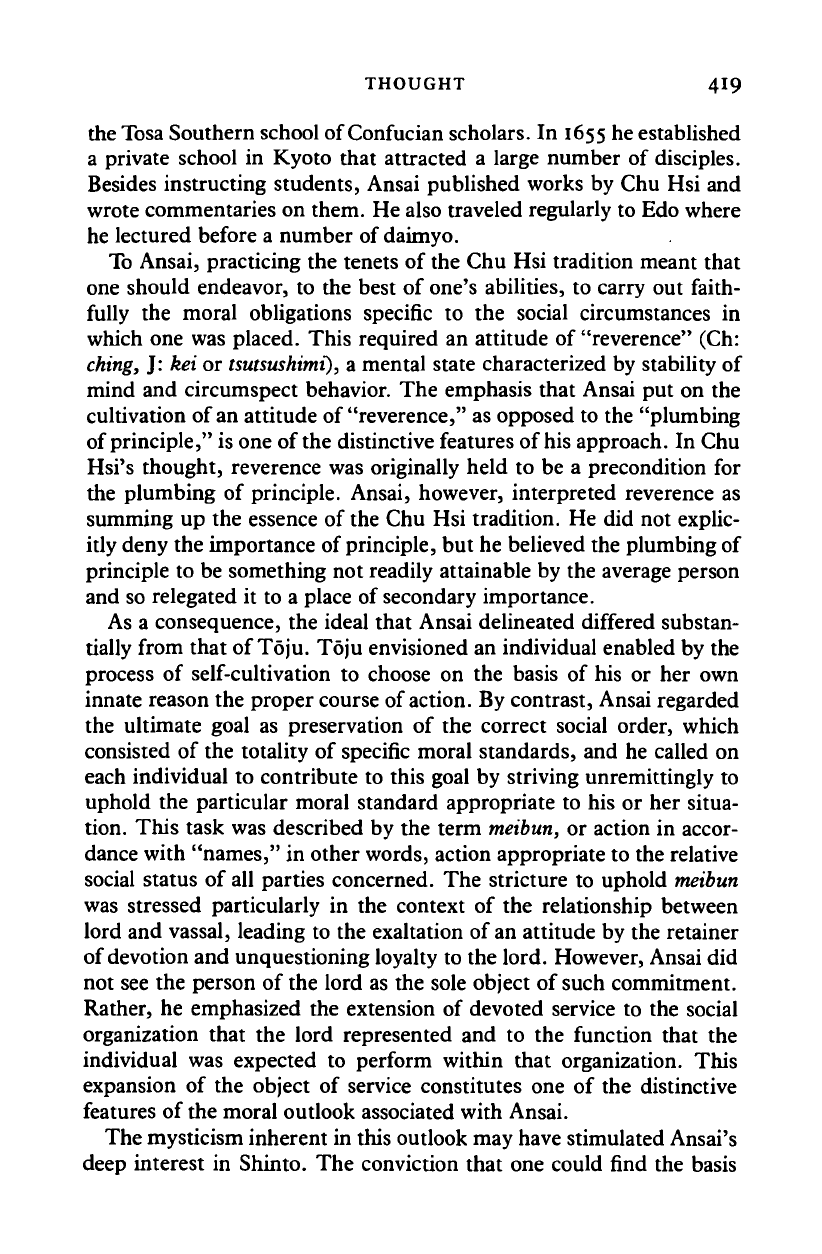
THOUGHT 419
the Tosa Southern school of Confucian scholars. In 1655 he established
a private school in Kyoto that attracted a large number of disciples.
Besides instructing students, Ansai published works by Chu Hsi and
wrote commentaries on them. He also traveled regularly to Edo where
he lectured before a number of daimyo.
To Ansai, practicing the tenets of the Chu Hsi tradition meant that
one should endeavor, to the best of one's abilities, to carry out faith-
fully the moral obligations specific to the social circumstances in
which one was placed. This required an attitude of "reverence" (Ch:
ching,
J: kei or
tsutsushimi),
a mental state characterized by stability of
mind and circumspect behavior. The emphasis that Ansai put on the
cultivation of an attitude of "reverence," as opposed to the "plumbing
of
principle,"
is one of the distinctive features of
his
approach. In Chu
Hsi's thought, reverence was originally held to be a precondition for
the plumbing of principle. Ansai, however, interpreted reverence as
summing up the essence of the Chu Hsi tradition. He did not explic-
itly deny the importance of
principle,
but he believed the plumbing of
principle to be something not readily attainable by the average person
and so relegated it to a place of secondary importance.
As a consequence, the ideal that Ansai delineated differed substan-
tially from that of Toju. Toju envisioned an individual enabled by the
process of self-cultivation to choose on the basis of his or her own
innate reason the proper course of
action.
By contrast, Ansai regarded
the ultimate goal as preservation of the correct social order, which
consisted of the totality of specific moral standards, and he called on
each individual to contribute to this goal by striving unremittingly to
uphold the particular moral standard appropriate to his or her situa-
tion. This task was described by the term
meibun,
or action in accor-
dance with "names," in other words, action appropriate to the relative
social status of all parties concerned. The stricture to uphold
meibun
was stressed particularly in the context of the relationship between
lord and vassal, leading to the exaltation of an attitude by the retainer
of devotion and unquestioning loyalty to the lord. However, Ansai did
not see the person of the lord as the sole object of such commitment.
Rather, he emphasized the extension of devoted service to the social
organization that the lord represented and to the function that the
individual was expected to perform within that organization. This
expansion of the object of service constitutes one of the distinctive
features of the moral outlook associated with Ansai.
The mysticism inherent in this outlook may have stimulated Ansai's
deep interest in Shinto. The conviction that one could find the basis
Cambridge Histories Online © Cambridge University Press, 2008
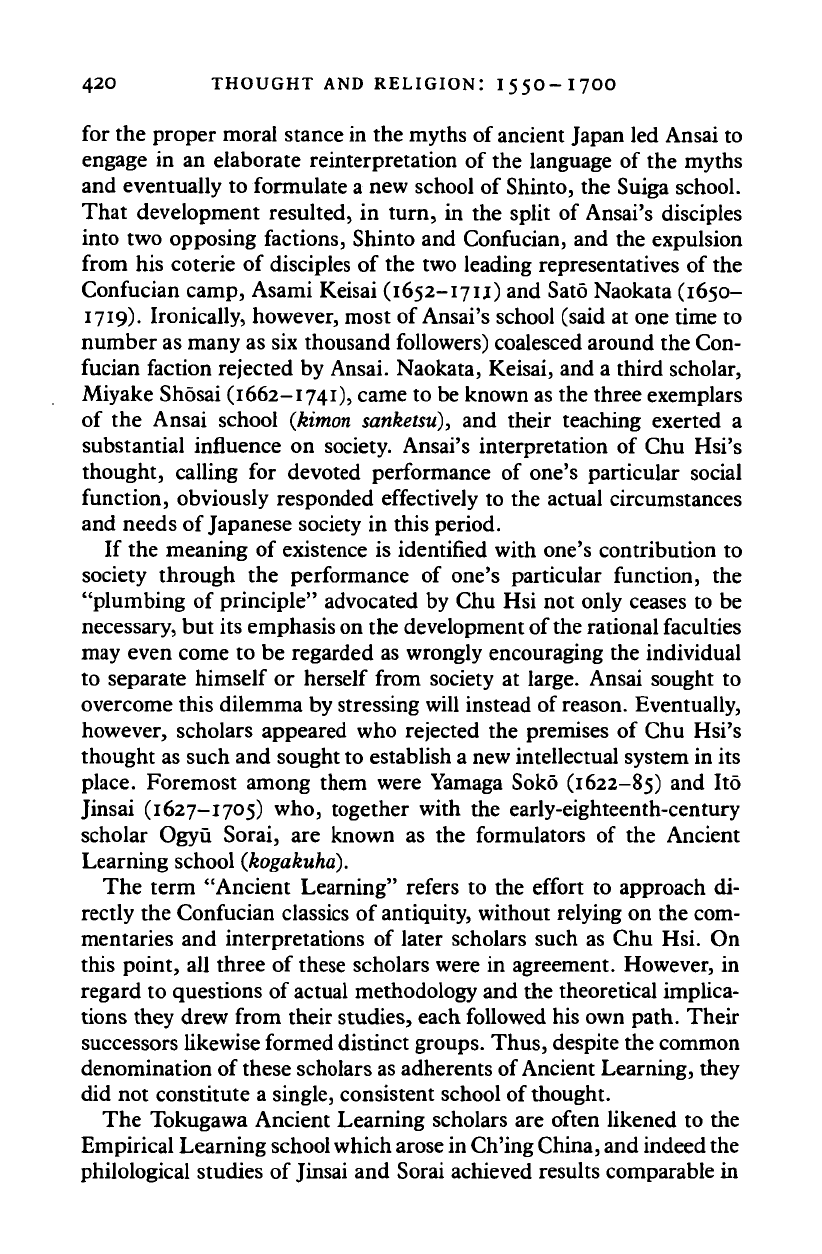
420 THOUGHT AND RELIGION: I55O-I7OO
for the proper moral stance in the myths of ancient Japan led Ansai to
engage in an elaborate reinterpretation of the language of the myths
and eventually to formulate a new school of Shinto, the Suiga school.
That development resulted, in turn, in the split of Ansai's disciples
into two opposing factions, Shinto and Confucian, and the expulsion
from his coterie of disciples of the two leading representatives of the
Confucian camp, Asami Keisai (1652-1711) and Sato Naokata (1650-
1719).
Ironically, however, most of Ansai's school (said at one time to
number as many as six thousand followers) coalesced around the Con-
fucian faction rejected by Ansai. Naokata, Keisai, and a third scholar,
Miyake Shosai (1662-1741), came to be known as the three exemplars
of the Ansai school
(Jkimon
sanketsu), and their teaching exerted a
substantial influence on society. Ansai's interpretation of Chu Hsi's
thought, calling for devoted performance of one's particular social
function, obviously responded effectively to the actual circumstances
and needs of Japanese society in this period.
If the meaning of existence is identified with one's contribution to
society through the performance of one's particular function, the
"plumbing of principle" advocated by Chu Hsi not only ceases to be
necessary, but its emphasis on the development of
the
rational faculties
may even come to be regarded as wrongly encouraging the individual
to separate himself or herself from society at large. Ansai sought to
overcome this dilemma by stressing will instead of
reason.
Eventually,
however, scholars appeared who rejected the premises of Chu Hsi's
thought as such and sought to establish a new intellectual system in its
place. Foremost among them were Yamaga Soko (1622-85)
an
d Ito
Jinsai (1627-1705) who, together with the early-eighteenth-century
scholar Ogyu Sorai, are known as the formulators of the Ancient
Learning school
(kogakuha).
The term "Ancient Learning" refers to the effort to approach di-
rectly the Confucian classics of antiquity, without relying on the com-
mentaries and interpretations of later scholars such as Chu Hsi. On
this point, all three of these scholars were in agreement. However, in
regard to questions of actual methodology and the theoretical implica-
tions they drew from their studies, each followed his own path. Their
successors likewise formed distinct groups. Thus, despite the common
denomination of these scholars as adherents of Ancient Learning, they
did not constitute a single, consistent school of thought.
The Tokugawa Ancient Learning scholars are often likened to the
Empirical Learning school which arose in Ch'ing China, and indeed the
philological studies of Jinsai and Sorai achieved results comparable in
Cambridge Histories Online © Cambridge University Press, 2008
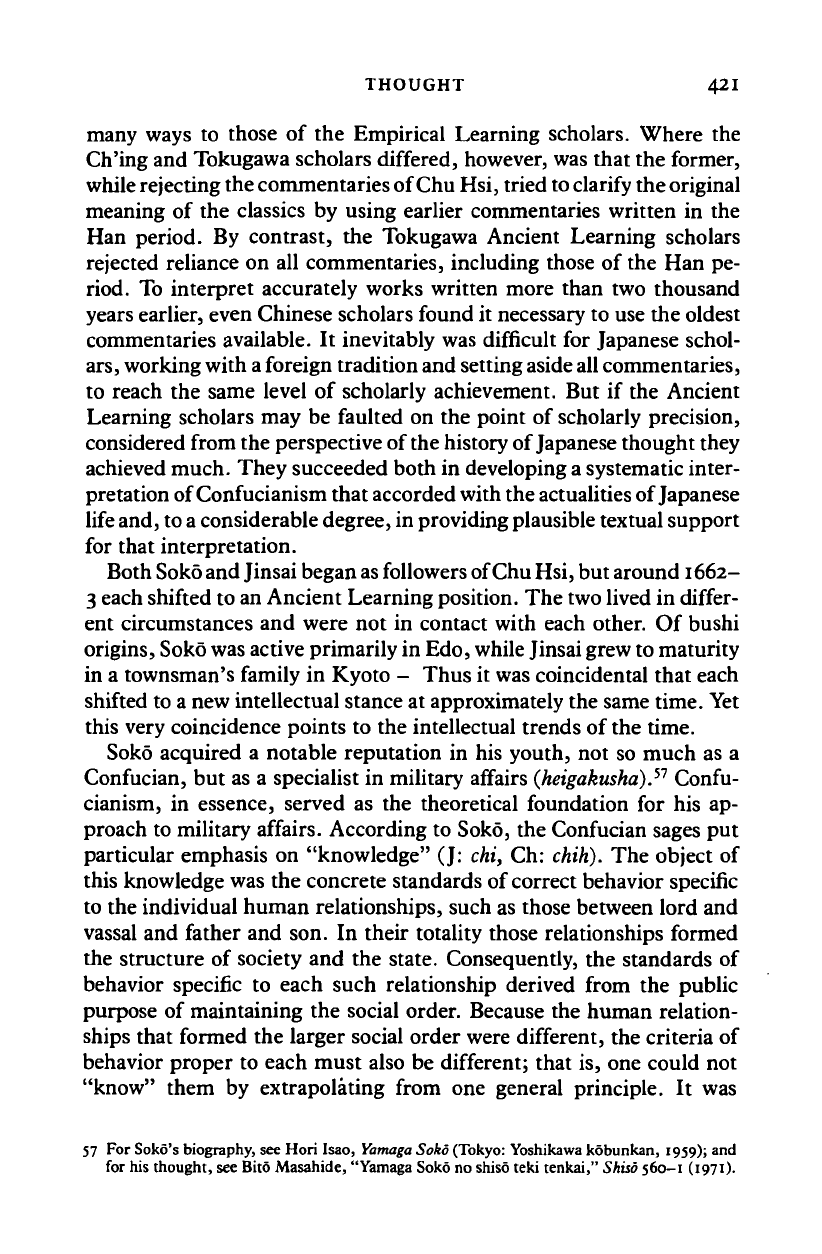
THOUGHT 421
many ways to those of the Empirical Learning scholars. Where the
Ch'ing and Tokugawa scholars differed, however, was that the former,
while
rejecting the commentaries of Chu Hsi, tried
to
clarify the original
meaning of the classics by using earlier commentaries written in the
Han period. By contrast, the Tokugawa Ancient Learning scholars
rejected reliance on all commentaries, including those of the Han pe-
riod. To interpret accurately works written more than two thousand
years earlier, even Chinese scholars found it necessary to use the oldest
commentaries available. It inevitably was difficult for Japanese schol-
ars,
working with
a
foreign tradition and setting
aside all
commentaries,
to reach the same level of scholarly achievement. But if the Ancient
Learning scholars may be faulted on the point of scholarly precision,
considered from the perspective of the history of Japanese thought they
achieved much. They succeeded both in developing
a
systematic inter-
pretation of Confucianism that accorded with the actualities of Japanese
life and,
to a
considerable
degree,
in providing plausible textual support
for that interpretation.
Both
Soko
and Jinsai began
as
followers of Chu
Hsi,
but around 1662-
3 each shifted to an Ancient Learning position. The two lived in differ-
ent circumstances and were not in contact with each other. Of bushi
origins,
Soko was
active primarily in Edo, while Jinsai grew to maturity
in a townsman's family in Kyoto - Thus it was coincidental that each
shifted to a new intellectual stance at approximately the same time. Yet
this very coincidence points to the intellectual trends of the time.
Soko acquired a notable reputation in his youth, not so much as a
Confucian, but as a specialist in military affairs
(heigakusha).
57
Confu-
cianism, in essence, served as the theoretical foundation for his ap-
proach to military affairs. According to Soko, the Confucian sages put
particular emphasis on "knowledge" (J: chi, Ch:
chih).
The object of
this knowledge was the concrete standards of correct behavior specific
to the individual human relationships, such as those between lord and
vassal and father and son. In their totality those relationships formed
the structure of society and the state. Consequently, the standards of
behavior specific to each such relationship derived from the public
purpose of maintaining the social order. Because the human relation-
ships that formed the larger social order were different, the criteria of
behavior proper to each must also be different; that is, one could not
"know" them by extrapolating from one general principle. It was
57 For Soko's biography, see Hori Isao,
Yamaga
Soko (Tokyo: Yoshikawa kobunkan, 1959); and
for his thought, see Bitd Masahide, "Yamaga Soko no shiso teki tenkai," Shiso 560-1 (1971).
Cambridge Histories Online © Cambridge University Press, 2008
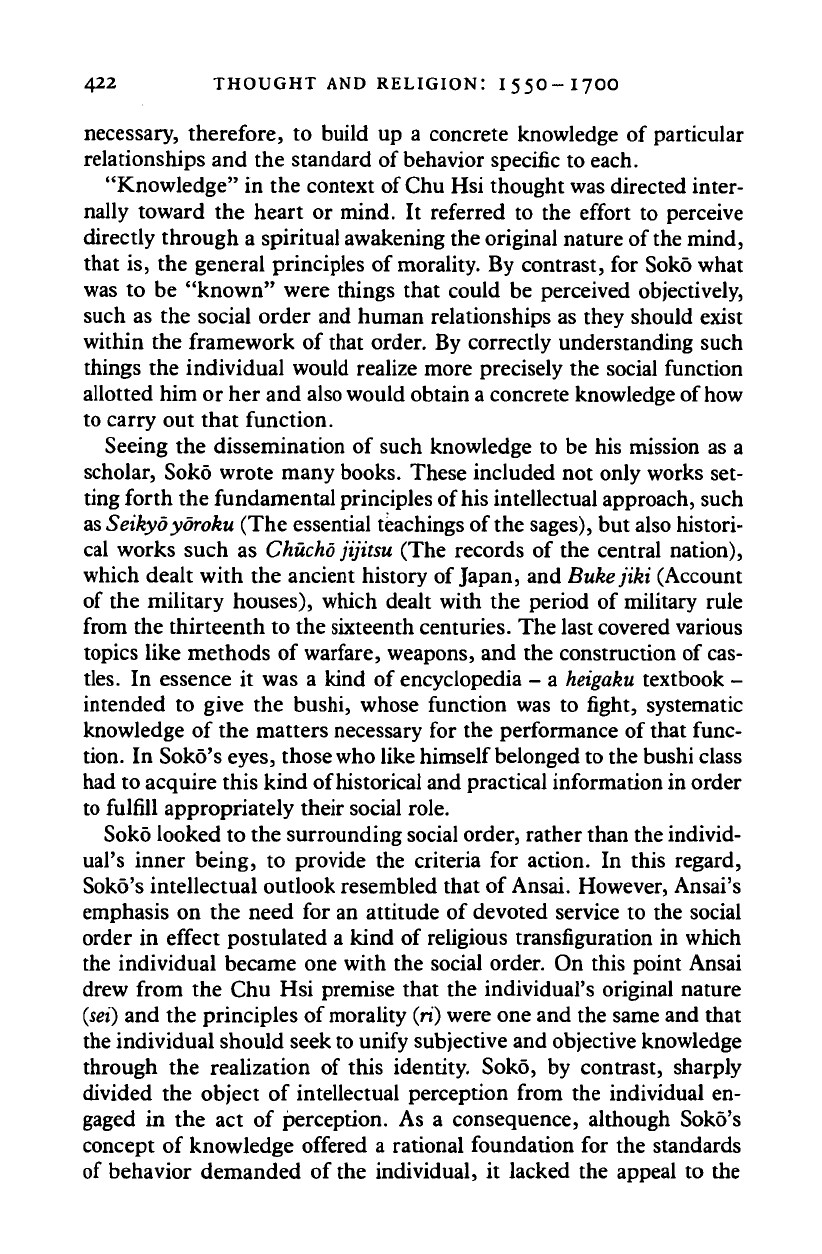
422 THOUGHT AND RELIGION: I55O-I7OO
necessary, therefore, to build up a concrete knowledge of particular
relationships and the standard of behavior specific to each.
"Knowledge" in the context of Chu Hsi thought was directed inter-
nally toward the heart or mind. It referred to the effort to perceive
directly through a spiritual awakening the original nature of
the
mind,
that is, the general principles of
morality.
By contrast, for Soko what
was to be "known" were things that could be perceived objectively,
such as the social order and human relationships as they should exist
within the framework of that order. By correctly understanding such
things the individual would realize more precisely the social function
allotted him or her and
also
would obtain a concrete knowledge of
how
to carry out that function.
Seeing the dissemination of such knowledge to be his mission as a
scholar, Soko wrote many books. These included not only works set-
ting forth the fundamental principles of his intellectual approach, such
as
Seikyo yoroku (The essential teachings of the sages), but also histori-
cal works such as
Chucho jijitsu
(The records of the central nation),
which dealt with the ancient history of Japan, and Bukejiki (Account
of the military houses), which dealt with the period of military rule
from the thirteenth to the sixteenth centuries. The last covered various
topics like methods of warfare, weapons, and the construction of cas-
tles.
In essence it was a kind of encyclopedia - a
heigaku
textbook -
intended to give the bushi, whose function was to fight, systematic
knowledge of the matters necessary for the performance of that func-
tion. In Soko's eyes, those who like himself belonged to the bushi class
had to acquire this kind of historical and practical information in order
to fulfill appropriately their social role.
Soko looked to the surrounding social order, rather than the individ-
ual's inner being, to provide the criteria for action. In this regard,
Soko's intellectual outlook resembled that of
Ansai.
However, Ansai's
emphasis on the need for an attitude of devoted service to the social
order in effect postulated a kind of religious transfiguration in which
the individual became one with the social order. On this point Ansai
drew from the Chu Hsi premise that the individual's original nature
(set)
and the principles of morality
(ri)
were one and the same and that
the individual should seek to unify subjective and objective knowledge
through the realization of this identity. Soko, by contrast, sharply
divided the object of intellectual perception from the individual en-
gaged in the act of perception. As a consequence, although Soko's
concept of knowledge offered a rational foundation for the standards
of behavior demanded of the individual, it lacked the appeal to the
Cambridge Histories Online © Cambridge University Press, 2008
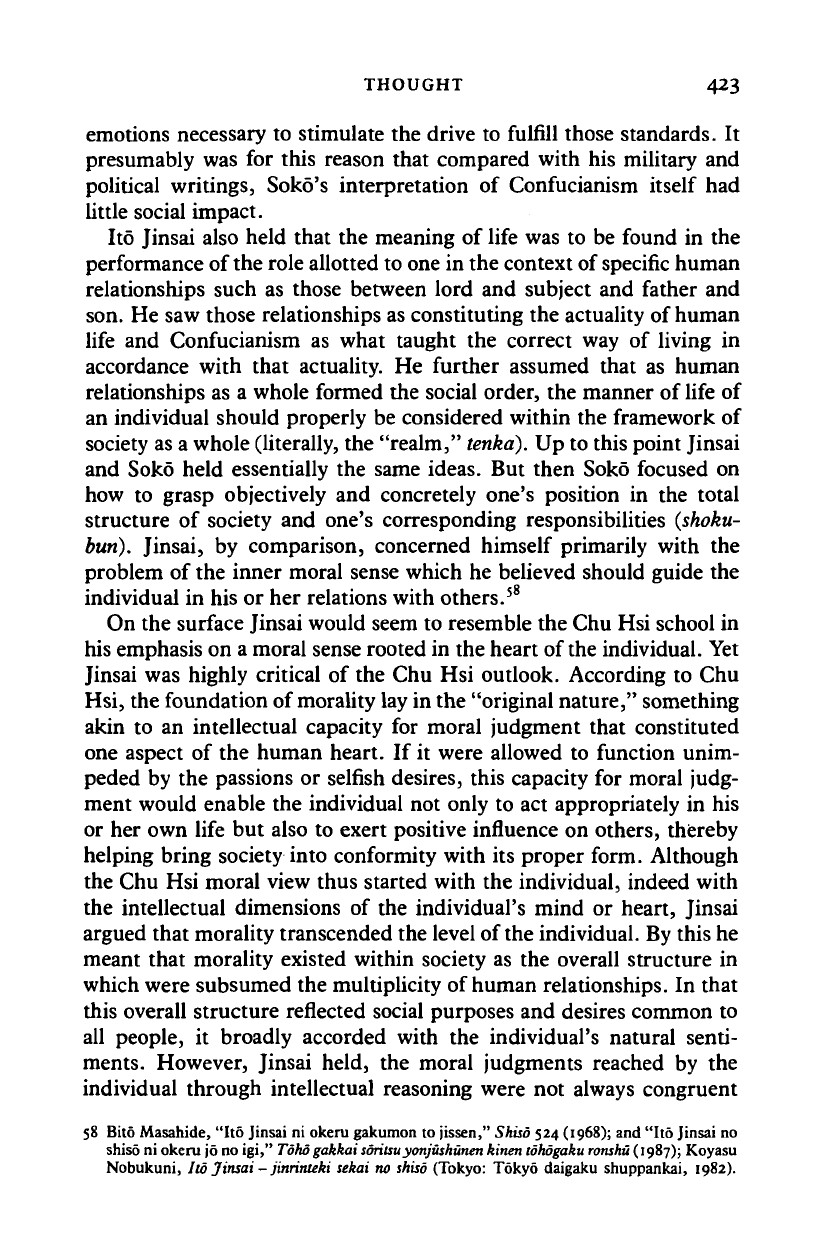
THOUGHT 423
emotions necessary to stimulate the drive to fulfill those standards. It
presumably was for this reason that compared with his military and
political writings, Soko's interpretation of Confucianism itself had
little social impact.
Ito Jinsai also held that the meaning of life was to be found in the
performance of the role allotted to one in the context of specific human
relationships such as those between lord and subject and father and
son. He saw those relationships as constituting the actuality of human
life and Confucianism as what taught the correct way of living in
accordance with that actuality. He further assumed that as human
relationships as a whole formed the social order, the manner of life of
an individual should properly be considered within the framework of
society as a whole (literally, the "realm,"
tenka).
Up to this point Jinsai
and Soko held essentially the same ideas. But then Soko focused on
how to grasp objectively and concretely one's position in the total
structure of society and one's corresponding responsibilities (shoku-
buri).
Jinsai, by comparison, concerned himself primarily with the
problem of the inner moral sense which he believed should guide the
individual in his or her relations with others.
58
On the surface Jinsai would seem to resemble the Chu Hsi school in
his emphasis on a moral sense rooted in the heart of the individual. Yet
Jinsai was highly critical of the Chu Hsi outlook. According to Chu
Hsi,
the foundation of morality lay in the "original nature," something
akin to an intellectual capacity for moral judgment that constituted
one aspect of the human heart. If it were allowed to function unim-
peded by the passions or selfish desires, this capacity for moral judg-
ment would enable the individual not only to act appropriately in his
or her own life but also to exert positive influence on others, thereby
helping bring society into conformity with its proper form. Although
the Chu Hsi moral view thus started with the individual, indeed with
the intellectual dimensions of the individual's mind or heart, Jinsai
argued that morality transcended the level of
the
individual. By this he
meant that morality existed within society as the overall structure in
which were subsumed the multiplicity of human relationships. In that
this overall structure reflected social purposes and desires common to
all people, it broadly accorded with the individual's natural senti-
ments. However, Jinsai held, the moral judgments reached by the
individual through intellectual reasoning were not always congruent
58 Bito Masahide, "Ito Jinsai ni okeru gakumon to jissen," Shiso 524 (1968); and "ltd Jinsai no
shiso ni okeru jo no igi,"
Toko
gakkai
soritsuyonjushunen kinen
whogaku
ronshu
(1987); Koyasu
Nobukuni, ltd Jinsai - jinrinteki sekai no shiso (Tokyo: Tokyo daigaku shuppankai, 1982).
Cambridge Histories Online © Cambridge University Press, 2008
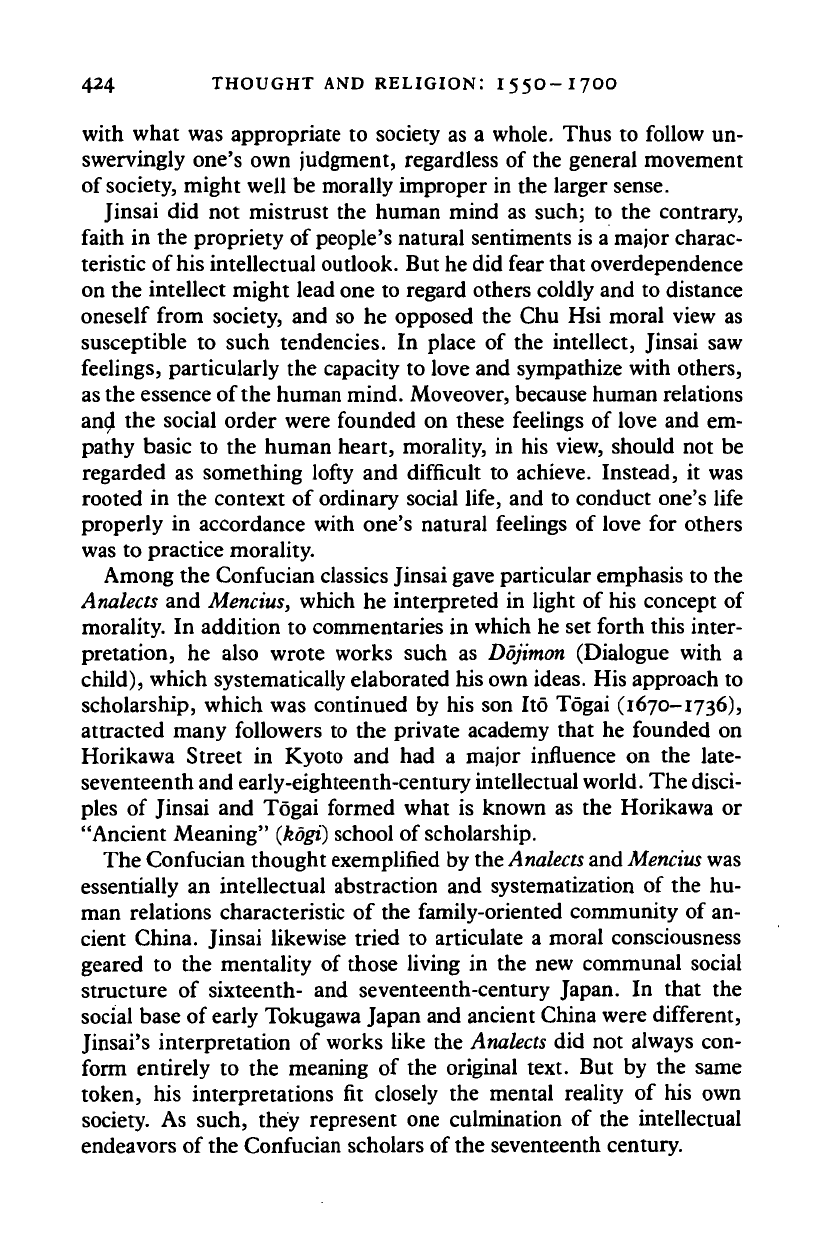
424 THOUGHT AND RELIGION: I55O-I7OO
with what was appropriate to society as a whole. Thus to follow un-
swervingly one's own judgment, regardless of the general movement
of
society,
might well be morally improper in the larger sense.
Jinsai did not mistrust the human mind as such; to the contrary,
faith in the propriety of people's natural sentiments is a major charac-
teristic of his intellectual outlook. But he did fear that overdependence
on the intellect might lead one to regard others coldly and to distance
oneself from society, and so he opposed the Chu Hsi moral view as
susceptible to such tendencies. In place of the intellect, Jinsai saw
feelings, particularly the capacity to love and sympathize with others,
as the essence of the human mind. Moveover, because human relations
and the social order were founded on these feelings of love and em-
pathy basic to the human heart, morality, in his view, should not be
regarded as something lofty and difficult to achieve. Instead, it was
rooted in the context of ordinary social life, and to conduct one's life
properly in accordance with one's natural feelings of love for others
was to practice morality.
Among the Confucian classics Jinsai gave particular emphasis to the
Analects
and
Mencius,
which he interpreted in light of his concept of
morality. In addition to commentaries in which he set forth this inter-
pretation, he also wrote works such as Dojimon (Dialogue with a
child),
which systematically elaborated his own ideas. His approach to
scholarship, which was continued by his son Ito Togai (1670-1736),
attracted many followers to the private academy that he founded on
Horikawa Street in Kyoto and had a major influence on the late-
seventeenth and early-eighteenth-century intellectual
world.
The disci-
ples of Jinsai and Togai formed what is known as the Horikawa or
"Ancient Meaning"
(kogi)
school of scholarship.
The Confucian thought exemplified by
the Analects
and
Mencius
was
essentially an intellectual abstraction and systematization of the hu-
man relations characteristic of the family-oriented community of an-
cient China. Jinsai likewise tried to articulate a moral consciousness
geared to the mentality of those living in the new communal social
structure of sixteenth- and seventeenth-century Japan. In that the
social base of early Tokugawa Japan and ancient China were different,
Jinsai's interpretation of works like the
Analects
did not always con-
form entirely to the meaning of the original text. But by the same
token, his interpretations fit closely the mental reality of his own
society. As such, they represent one culmination of the intellectual
endeavors of the Confucian scholars of the seventeenth century.
Cambridge Histories Online © Cambridge University Press, 2008
